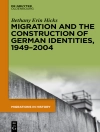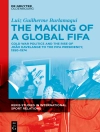Until the end of the Cold War in 1990, building projects and architectural icons played an important role in the self-portrayal of the competing systems. However, as the current research shows, we also find a large variety of forms of cooperation between the East, the South, and the West, not to forget the manifold cross-border entanglements within the South or the East. This book explores the intersection of two strands of research. On the one hand, interaction in the field of architecture and construction between actors from socialist countries and from countries of the Global South have increasingly won interest amongst historians of architecture and planning. On the other hand, in the context of the strongly emerging Cold War Studies, scholars have explored cooperation and circulation across the Iron Curtain with a focus on economic and research planning.
This book connects perspectives of planning, construction and architectural design with those on economic interests and conflicts in projects and networks. Furthermore, it opens the view to the hubs of communication and exchange, and on patterns of longterm transformation and appropriation of architecture.
เกี่ยวกับผู้แต่ง
Christoph Bernhardt, Leibniz-Institute IRS; Andreas Butter, Leibniz-Institute IRS; Monika Motylińska, Leibniz-Institute IRS.












